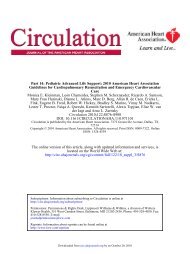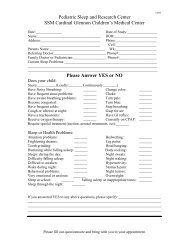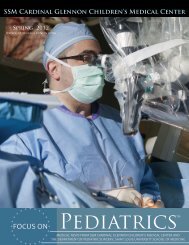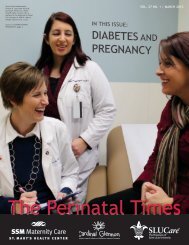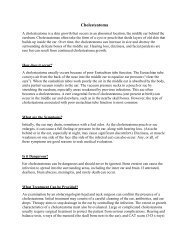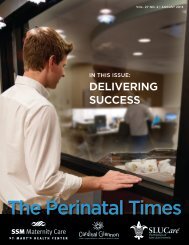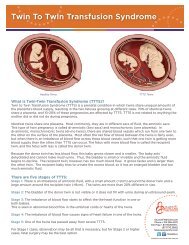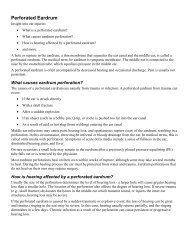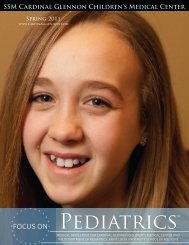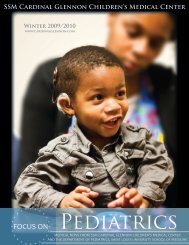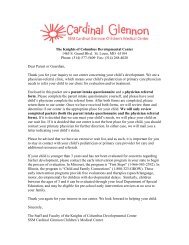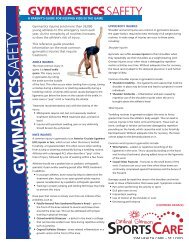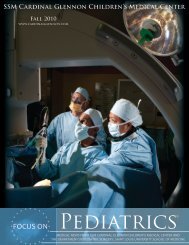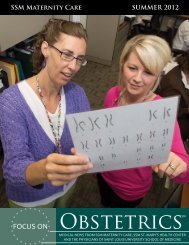QIPS Program - SSM Cardinal Glennon Children's Medical Center
QIPS Program - SSM Cardinal Glennon Children's Medical Center
QIPS Program - SSM Cardinal Glennon Children's Medical Center
You also want an ePaper? Increase the reach of your titles
YUMPU automatically turns print PDFs into web optimized ePapers that Google loves.
CME & CEU<br />
Physician CMEs<br />
<strong>SSM</strong> St. Mary’s Health <strong>Center</strong> is accredited by<br />
the Missouri State <strong>Medical</strong> Association to provide<br />
continuing medical education for physicians.<br />
<strong>SSM</strong> St. Mary’s Health <strong>Center</strong> designates this<br />
educational activity for a maximum of 3 AMA PRA<br />
Category 1 Credit(s). Physicians should only<br />
claim credit commensurate with the extent of<br />
their participation in the activity.<br />
Nursing CEUs<br />
<strong>SSM</strong> St. Mary’s Health <strong>Center</strong> is an approved<br />
provider of continuing nursing education by the<br />
Missouri Nurses Association, an accredited<br />
approver by the American Nurses Credentialing<br />
<strong>Center</strong>’s Commission on Accreditation.<br />
3.0 contact hours are available.<br />
Contact Us<br />
If you have any questions about<br />
the program or want to schedule a<br />
simulation contact the Q.I.P.S. Team.<br />
(314) 577-5317<br />
ssmhealth.com/stmarys<br />
cardinalglennon.com<br />
Team Members<br />
Carolyn Pryor, MD<br />
<strong>Medical</strong> Director<br />
<strong>SSM</strong> Maternal Services<br />
Glenn Barber, RNC, BSN<br />
Perinatal Outreach Educator<br />
<strong>SSM</strong> <strong>Cardinal</strong> <strong>Glennon</strong><br />
Children’s <strong>Medical</strong> <strong>Center</strong><br />
Pam Randazzo, RNC, BSN<br />
Perinatal Outreach Educator<br />
<strong>SSM</strong> St. Mary’s Health <strong>Center</strong><br />
Judy Silvey, RN, BSN<br />
Perinatal Outreach Educator<br />
<strong>SSM</strong> <strong>Cardinal</strong> <strong>Glennon</strong><br />
Children’s <strong>Medical</strong> <strong>Center</strong><br />
Connie Thompson, RNC, BSN<br />
Perinatal Outreach Educator<br />
<strong>SSM</strong> St. Mary’s Health <strong>Center</strong><br />
Quality<br />
Improvement<br />
through<br />
Perinatal<br />
Simulation<br />
Funding for Q.I.P.S. is provided<br />
in part by the Illinois Department<br />
of Public Health.<br />
Perinatal Outreach Services
Why Simulation<br />
Simulation is an advanced modality for<br />
observing group dynamics and building a more<br />
effective team.<br />
A wider breadth of medical crisis scenarios can<br />
be recreated using a high fidelity simulation<br />
mannequin in a safe, flexible, and realistic<br />
teaching environment.<br />
The outcomes of this learning and teaching<br />
method far surpass those of textbook, lecture,<br />
and computer based learning.<br />
Benefits<br />
Until recently, teamwork and crisis<br />
management have been difficult concepts to<br />
teach and evaluate in a quantifiable manner.<br />
Optimal patient outcomes, however, have<br />
always depended on a team’s knowledge,<br />
efficiency, and ability to work together.<br />
Through simulation, a health care team can<br />
learn the physiologic components of crisis<br />
management. They can also improve technical<br />
skills, equipment knowledge, and develop<br />
the leadership and teamwork needed to<br />
successfully deliver exceptional health care.<br />
Obstetrics is a high risk specialty, in which<br />
emergencies are, to some extent, inevitable.<br />
Training staff to manage these emergencies is<br />
a fundamental principal of risk management.<br />
Traditional risk management strategies based<br />
on incident reporting and event analysis<br />
are reactive and not always effective.<br />
Simulation-based training is an appropriate<br />
proactive approach to reducing the errors<br />
and risks inherent in obstetrics. Teamwork<br />
and communication will also improve<br />
while simultaneously giving the students a<br />
multiplicity of transferable skills to advance<br />
their personal performance.<br />
Q.I.P.S. <strong>Program</strong><br />
The Quality Improvement through Perinatal<br />
Simulation team is comprised of experienced<br />
neonatal and maternal educators as well as<br />
the <strong>Medical</strong> Director of <strong>SSM</strong> Maternal Services.<br />
The Q.I.P.S. Team will put health care<br />
providers through emergency situations in real<br />
time using the NOELLE TM Birthing Simulator<br />
and the Newborn HAL ® Team Trainer. These<br />
state-of-the-art simulators are fully responsive<br />
with life-like behaviors and reactions. Some of<br />
the high risk scenarios that can be presented<br />
include shoulder dystocia, hemorrhage, breech<br />
delivery, and emergency cesarean section.<br />
Simulation training enhances team dynamics,<br />
builds confidence and enhances skills in a riskfree<br />
environment. Multi-disciplinary simulation<br />
training allows health care providers to acquire<br />
cognitive, technical and behavioral skills to<br />
manage crises, avoid adverse events and<br />
ultimately improve patient outcomes.<br />
Teams that work together<br />
can greatly improve outcomes<br />
over groups that are simply<br />
together working.



